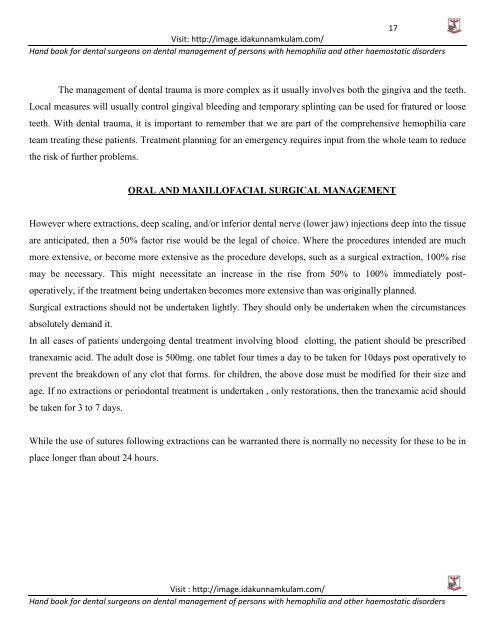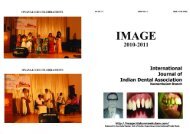hand book for dental surgeons - Indian Dental Association ...
hand book for dental surgeons - Indian Dental Association ...
hand book for dental surgeons - Indian Dental Association ...
You also want an ePaper? Increase the reach of your titles
YUMPU automatically turns print PDFs into web optimized ePapers that Google loves.
17<br />
Visit: http://image.idakunnamkulam.com/<br />
Hand <strong>book</strong> <strong>for</strong> <strong>dental</strong> <strong>surgeons</strong> on <strong>dental</strong> management of persons with hemophilia and other haemostatic disorders<br />
The management of <strong>dental</strong> trauma is more complex as it usually involves both the gingiva and the teeth.<br />
Local measures will usually control gingival bleeding and temporary splinting can be used <strong>for</strong> fratured or loose<br />
teeth. With <strong>dental</strong> trauma, it is important to remember that we are part of the comprehensive hemophilia care<br />
team treating these patients. Treatment planning <strong>for</strong> an emergency requires input from the whole team to reduce<br />
the risk of further problems.<br />
ORAL AND MAXILLOFACIAL SURGICAL MANAGEMENT<br />
However where extractions, deep scaling, and/or inferior <strong>dental</strong> nerve (lower jaw) injections deep into the tissue<br />
are anticipated, then a 50% factor rise would be the legal of choice. Where the procedures intended are much<br />
more extensive, or become more extensive as the procedure develops, such as a surgical extraction, 100% rise<br />
may be necessary. This might necessitate an increase in the rise from 50% to 100% immediately post-<br />
operatively, if the treatment being undertaken becomes more extensive than was originally planned.<br />
Surgical extractions should not be undertaken lightly. They should only be undertaken when the circumstances<br />
absolutely demand it.<br />
In all cases of patients undergoing <strong>dental</strong> treatment involving blood clotting, the patient should be prescribed<br />
tranexamic acid. The adult dose is 500mg. one tablet four times a day to be taken <strong>for</strong> 10days post operatively to<br />
prevent the breakdown of any clot that <strong>for</strong>ms. <strong>for</strong> children, the above dose must be modified <strong>for</strong> their size and<br />
age. If no extractions or periodontal treatment is undertaken , only restorations, then the tranexamic acid should<br />
be taken <strong>for</strong> 3 to 7 days.<br />
While the use of sutures following extractions can be warranted there is normally no necessity <strong>for</strong> these to be in<br />
place longer than about 24 hours.<br />
Visit : http://image.idakunnamkulam.com/<br />
Hand <strong>book</strong> <strong>for</strong> <strong>dental</strong> <strong>surgeons</strong> on <strong>dental</strong> management of persons with hemophilia and other haemostatic disorders



